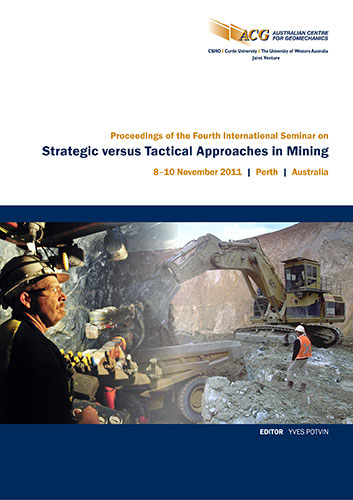Strategic and tactical use of a community based regional seismic monitoring system

|
Authors: Hudyma, MR; Wesseloo, J |
DOI https://doi.org/10.36487/ACG_rep/1108_13_Hudyma
Cite As:
Hudyma, MR & Wesseloo, J 2011, 'Strategic and tactical use of a community based regional seismic monitoring system', in Y Potvin (ed.), Strategic versus Tactical 2011: Proceedings of the Fourth International Seminar on Strategic versus Tactical Approaches in Mining, Australian Centre for Geomechanics, Perth, pp. 169-177, https://doi.org/10.36487/ACG_rep/1108_13_Hudyma
Abstract:
The Australian Centre for Geomechanics (ACG) has developed a simple, but effective, regional seismic monitoring system that has a number of strategic and tactical applications for monitoring seismicity in mines. From a strategic perspective, installation of a regional seismic sensor is a means of evaluating the severity of a local seismicity problem. This can help decide if a full-blown in-mine microseismic monitoring system is required. From a tactical perspective, a regional seismic sensor can provide a series of operational benefits, including: blast vibration monitoring, blast diagnostics monitoring, identifying events within mine blasts, monitoring of near-mine seismic events, and as backup for an in-mine microseismic system. The versatility of stand-alone regional seismic sensors make them useful tools for mines that do not have a seismic monitoring system, as well as for mines with established in-mine seismic systems.
References:
Gutenberg, B. and Richter, C.F. (1944) Frequency of earthquakes in California, Bulletin of the Seismological Society of America,
Vol. 34, pp. 185–188.
Hudyma, M.R. (2004) Mining induced seismicity in underground, mechanised, hardrock mines – Results of a world wide survey, Australian Centre for Geomechanics Research Report, 138 p.
Hudyma, M.R. and Brummer, R.K. (2007) Seismic Monitoring in Mines – Design, Operation, Tricks and Traps, in Proceedings from the 1st Canada-U.S. Rock Mechanics Symposium, Vancouver, pp. 1423–1430.
© Copyright 2026, Australian Centre for Geomechanics (ACG), The University of Western Australia. All rights reserved.
View copyright/legal information
Please direct any queries or error reports to repository-acg@uwa.edu.au
View copyright/legal information
Please direct any queries or error reports to repository-acg@uwa.edu.au